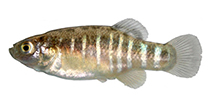| Family: |
Aphaniidae (Oriental killifishes) |
| Max. size: |
6.124 cm TL (male/unsexed); 7.6 cm TL (female); max.weight: 3.7 g; max.weight: 7.1 g |
| Environment: |
benthopelagic; freshwater; pH range: 6.19999980926514 - 6.5, non-migratory |
| Distribution: |
Asia: Iran. |
| Diagnosis: |
Dorsal soft rays (total): 11-14; Anal soft rays: 11-13 |
| Biology: |
Collected from an altitude of approximately 2,380 meters on a small plain between high ranges at the easternmost edge of the Zagros Mountains; from a large pool in the upper reaches of the Karun River basin which drains to the head of the Persian Gulf; shallow water at about 4 cm depth; cloudy water over mud and pebbles; with Myriophyllum (Ref. 38795) and Potamogeton sp. which are the dominant aquatic plants used as spawning substrate (Ref. 54276). Not a seasonal killifish (Ref. 27139).
Parasites ( Trichodina sp., Gyrodactylus sp., Diplostomum spathaceum, Allocreadium isoporum, Allocreadium pseudaspii, Ornithodiplostomum sp., Contracecum sp., and Acanthocephalorhynchoides cholodkowskyi) were found from a collected sample of Aphanius vladykovi in Gandoman lagoon (Ref. 125593). |
| IUCN Red List Status: |
Not Evaluated (N.E.) Ref. (130435)
|
| Threat to humans: |
harmless |
Source and more info: www.fishbase.org. For personal, classroom, and other internal use only. Not for publication.

